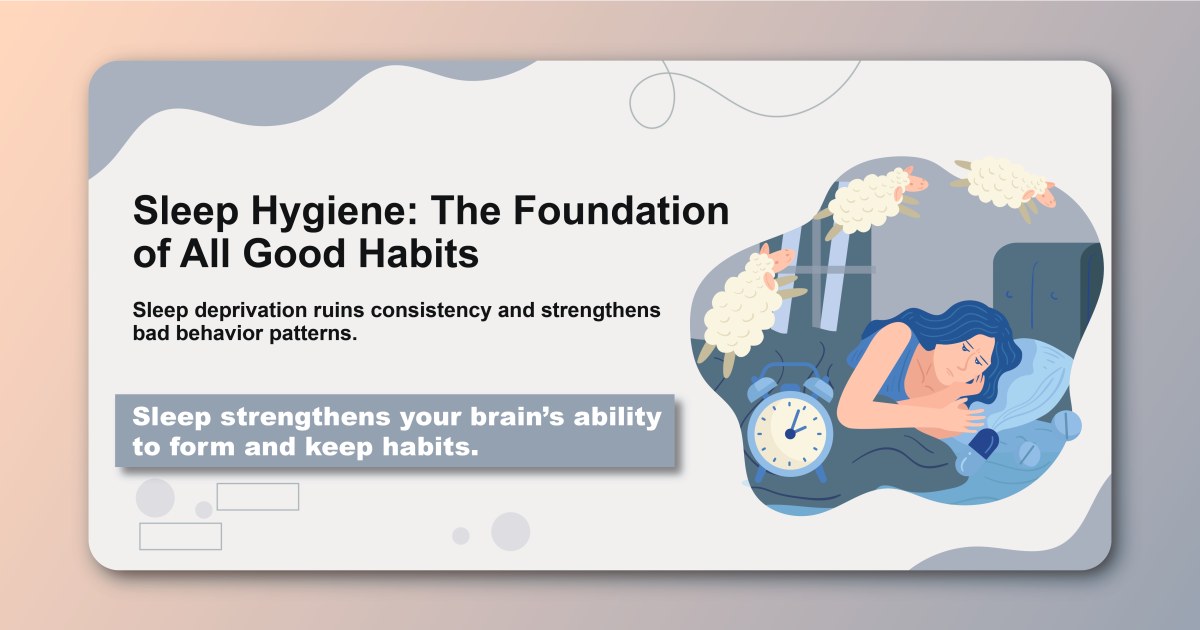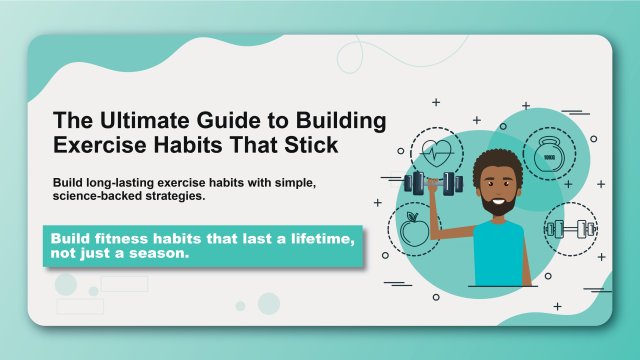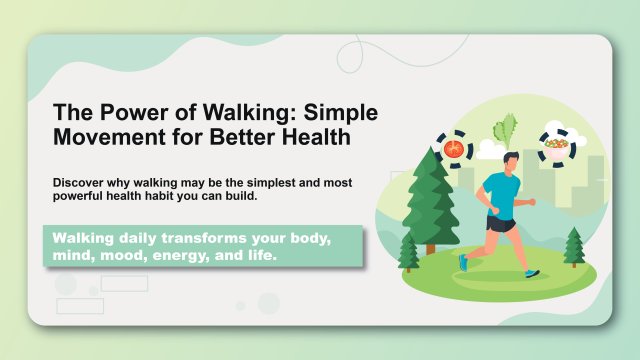Every successful habit you want to build—from exercise and nutrition to productivity and mindfulness—depends on one fundamental factor that most people overlook: the quality of your sleep. While we focus on willpower, motivation, and complex strategies, we often ignore the most basic requirement for habit formation: a well-rested brain that can make good decisions, resist temptations, and maintain consistency.
Sleep isn't just recovery time—it's when your brain consolidates memories, processes emotions, and literally cleans itself of toxins. When you're sleep-deprived, your prefrontal cortex (responsible for decision-making and self-control) goes offline, while your amygdala (responsible for emotional reactions) becomes hyperactive. This neurological imbalance makes it nearly impossible to stick to your good intentions.
The research is clear: people who sleep well are more successful at building and maintaining healthy habits, while those who sleep poorly struggle with everything from diet and exercise to work performance and emotional regulation. Yet sleep hygiene—the practices that promote consistent, quality sleep—is often treated as optional rather than essential.
When you prioritize sleep hygiene as the foundation of your habit formation strategy, everything else becomes easier. Your energy improves, your mood stabilizes, your decision-making sharpens, and your ability to resist temptation strengthens. Sleep hygiene isn't just another habit to build—it's the meta-habit that makes all other habits possible.
The Science of Sleep and Habit Formation
How Sleep Affects Your Brain
Memory Consolidation: During sleep, your brain transfers information from short-term to long-term memory, including the neural patterns that form habits.
Prefrontal Cortex Function: Sleep deprivation significantly impairs the brain region responsible for decision-making, planning, and impulse control.
Neurotransmitter Balance: Quality sleep regulates dopamine, serotonin, and other neurotransmitters essential for motivation and mood regulation.
Glymphatic System: Your brain's waste removal system operates primarily during sleep, clearing toxins that accumulate during waking hours.
The Sleep-Habit Connection
Decision Fatigue: Poor sleep depletes your daily reservoir of decision-making energy, making it harder to choose good habits over bad ones.
Emotional Regulation: Sleep-deprived individuals have heightened emotional responses and reduced ability to manage stress, disrupting habit consistency.
Impulse Control: Lack of sleep weakens your ability to resist immediate gratification in favor of long-term goals.
Energy Management: Quality sleep provides the physical and mental energy necessary to maintain demanding habits like exercise or learning.
Research Findings
Stanford Study: Athletes who extended sleep to 10 hours per night improved performance by 11.4% and reduced reaction time significantly.
Harvard Research: Sleep-deprived individuals were 55% more likely to become obese, as poor sleep disrupts hormones that regulate hunger and satiety.
University of Pennsylvania: After just one week of sleeping 4-6 hours per night, participants showed cognitive performance equivalent to staying awake for 48-72 hours straight.
The Components of Sleep Hygiene
Sleep Environment Optimization
Temperature Control
- Ideal range: 65-68°F (18-20°C)
- Cooler temperatures signal your body to prepare for sleep
- Gradual temperature drop helps initiate the sleep cycle
Light Management
- Complete darkness or blackout curtains
- Remove or cover LED lights from electronics
- Use warm, dim lighting 2-3 hours before bedtime
- Consider blue light blocking glasses for evening screen use
Sound Control
- Minimize disruptive noises
- Use white noise, earplugs, or sound machines if needed
- Consistent, gentle sounds can actually improve sleep quality
- Address partner snoring or movement issues
Comfort Factors
- Invest in a quality mattress and pillows
- Choose breathable, comfortable bedding
- Ensure adequate space for comfortable positioning
- Keep bedroom clean and clutter-free for mental peace
Pre-Sleep Routine Development
The Power of Consistency
- Go to bed and wake up at the same time every day (including weekends)
- Develop a 30-60 minute wind-down routine
- Signal to your brain that sleep time is approaching
- Make your routine relaxing and enjoyable, not burdensome
Effective Pre-Sleep Activities
- Reading fiction or non-stimulating material
- Gentle stretching or restorative yoga
- Meditation or breathing exercises
- Journaling or gratitude practice
- Listening to calming music or nature sounds
Activities to Avoid
- Intense exercise within 3 hours of bedtime
- Large meals or alcohol within 2-3 hours of sleep
- Caffeine after 2 PM (or 6-8 hours before bedtime)
- Emotional or stressful conversations
- Bright screens without blue light protection
Daytime Habits That Affect Sleep
Light Exposure
- Get bright light exposure within 30 minutes of waking
- Spend time outdoors during the day, especially morning and afternoon
- Use a light therapy box if natural light is limited
- Dim lights in the evening to prepare for sleep
Physical Activity
- Regular exercise improves sleep quality and duration
- Morning or afternoon exercise is ideal
- Even light movement during the day can improve nighttime sleep
- Avoid intense workouts close to bedtime
Caffeine and Nutrition
- Limit caffeine to morning hours
- Avoid large meals close to bedtime
- Consider a light, protein-rich snack if hungry before sleep
- Stay hydrated during the day but reduce fluids 2 hours before bed
Common Sleep Disruptors and Solutions
Technology and Blue Light
The Problem: Blue light from screens suppresses melatonin production, delaying sleep onset and reducing sleep quality.
Solutions:
- Use night mode or blue light filters on all devices
- Stop screen use 1-2 hours before bedtime
- Keep phones and tablets out of the bedroom
- Use an analog alarm clock instead of your phone
- If you must use devices, wear blue light blocking glasses
Stress and Racing Thoughts
The Problem: Stress hormones and mental chatter interfere with the relaxation necessary for sleep.
Solutions:
- Practice meditation or deep breathing exercises
- Keep a "worry journal" to externalize concerns
- Use progressive muscle relaxation techniques
- Develop a mental "closing time" for work and stressful thoughts
- Consider therapy for chronic stress or anxiety
Irregular Schedule
The Problem: Inconsistent sleep and wake times disrupt your circadian rhythm.
Solutions:
- Prioritize consistency over total sleep time
- Use light therapy to adjust your internal clock
- Gradually shift your schedule by 15-30 minutes if changes are needed
- Maintain your schedule even on weekends when possible
- Plan for and minimize jet lag effects when traveling
Environmental Factors
The Problem: Noise, light, temperature, or comfort issues disrupt sleep quality.
Solutions:
- Invest in blackout curtains or an eye mask
- Use a white noise machine or earplugs
- Adjust thermostat or use fans for temperature control
- Upgrade mattress, pillows, or bedding as needed
- Address partner sleep issues collaboratively
Building Your Sleep Hygiene Routine
Assessment and Baseline
Sleep Tracking
- Monitor your current sleep patterns for 1-2 weeks
- Track bedtime, wake time, and perceived sleep quality
- Note factors that seem to affect your sleep
- Use apps, wearables, or simple sleep journals
Identify Problem Areas
- What time do you naturally feel sleepy?
- What consistently disrupts your sleep?
- How do you feel and perform after good vs. poor sleep?
- What environmental factors need improvement?
Creating Your Ideal Routine
Design Your Wind-Down
- Choose 3-5 relaxing activities for your pre-sleep routine
- Start your routine at the same time each night
- Make it enjoyable and something you look forward to
- Keep it simple enough to maintain consistently
Optimize Your Environment
- Address the biggest environmental disruptors first
- Make gradual improvements rather than changing everything at once
- Invest in quality where it makes the biggest difference
- Create a bedroom that feels like a sanctuary
Establish Consistency
- Choose realistic bedtime and wake times you can maintain
- Start with small changes and build gradually
- Focus on consistency over perfection
- Plan for how you'll handle disruptions
Implementation Strategy
Week 1-2: Environmental Setup
- Optimize bedroom temperature, lighting, and comfort
- Remove or minimize obvious sleep disruptors
- Establish a basic pre-sleep routine
- Begin tracking sleep patterns
Week 3-4: Routine Refinement
- Adjust timing and activities based on initial results
- Fine-tune environmental factors
- Address any remaining technology or light issues
- Build consistency in sleep and wake times
Week 5-8: Optimization
- Make advanced adjustments based on data and experience
- Address any remaining issues or obstacles
- Develop strategies for handling disruptions
- Integrate sleep hygiene with other habit formation efforts
Sleep Hygiene for Different Lifestyles
Shift Workers and Non-Traditional Schedules
Challenges: Irregular hours, limited light exposure, social pressures Strategies:
- Maintain consistency within your unique schedule
- Use blackout curtains and sleep masks for daytime sleep
- Communicate your sleep needs to family and friends
- Consider melatonin supplementation (with medical guidance)
Parents and Caregivers
Challenges: Interrupted sleep, irregular schedules, stress Strategies:
- Prioritize sleep hygiene basics when possible
- Use "sleep when the baby sleeps" wisely
- Share nighttime responsibilities with partners
- Create backup plans for sleep disruptions
Frequent Travelers
Challenges: Time zone changes, unfamiliar environments, schedule disruption Strategies:
- Maintain core sleep hygiene practices regardless of location
- Bring portable comfort items (pillow, eye mask, earplugs)
- Adjust to new time zones gradually when possible
- Use light therapy to manage jet lag
Students and Night Owls
Challenges: Late-night activities, social pressures, irregular schedules Strategies:
- Find your natural sleep-wake preferences and work with them
- Prioritize consistency even if your schedule is later than average
- Create boundaries around late-night activities
- Use strategic caffeine timing to support your preferred schedule
The Connection Between Sleep and Specific Habits
Exercise Habits
How Sleep Helps: Improves motivation, energy, recovery, and injury prevention Sleep Strategies: Avoid intense evening workouts, use exercise to regulate circadian rhythm Timing: Morning light exposure after exercise can strengthen your sleep-wake cycle
Nutrition Habits
How Sleep Helps: Regulates hunger hormones, improves decision-making around food Sleep Strategies: Avoid large meals before bed, consider magnesium-rich foods for sleep Connection: Poor sleep increases cravings for high-calorie, processed foods
Productivity Habits
How Sleep Helps: Enhances focus, creativity, memory, and decision-making Sleep Strategies: Consistent wake times improve morning productivity routines Planning: Use evening wind-down time for next-day preparation
Mindfulness and Meditation
How Sleep Helps: Improves emotional regulation and mental clarity for practice Sleep Strategies: Meditation can be part of your pre-sleep routine Synergy: Mindfulness practices improve sleep quality, creating a positive feedback loop
Troubleshooting Common Sleep Issues
"I Can't Fall Asleep"
Possible Causes: Racing thoughts, poor sleep environment, irregular schedule Solutions:
- Develop a consistent pre-sleep routine
- Practice relaxation techniques
- Ensure complete darkness and cool temperature
- Consider cognitive behavioral therapy for insomnia (CBT-I)
"I Wake Up Multiple Times"
Possible Causes: Stress, environmental factors, sleep disorders Solutions:
- Address room temperature and noise issues
- Limit fluids before bedtime
- Manage stress through daytime practices
- Consult a healthcare provider if problems persist
"I Wake Up Tired"
Possible Causes: Poor sleep quality, sleep disorders, inconsistent schedule Solutions:
- Track sleep patterns to identify issues
- Consider sleep study if problems persist
- Evaluate medications that might affect sleep
- Improve sleep environment and routine consistency
"I Can't Maintain a Consistent Schedule"
Possible Causes: Work demands, social obligations, poor prioritization Solutions:
- Gradually shift schedule by 15-30 minutes
- Communicate sleep needs to others
- Use light therapy to adjust circadian rhythm
- Prioritize sleep as non-negotiable self-care
Advanced Sleep Optimization
Sleep Tracking and Analysis
Technology Options:
- Wearable devices for heart rate and movement tracking
- Smartphone apps for basic sleep monitoring
- Smart mattresses or sleep sensors
- Professional sleep studies for persistent issues
Key Metrics to Monitor:
- Total sleep time and sleep efficiency
- Time to fall asleep and number of awakenings
- Sleep stages (if available)
- Subjective sleep quality and next-day performance
Supplements and Natural Aids
Evidence-Based Options (consult healthcare providers):
- Melatonin for circadian rhythm support
- Magnesium for muscle relaxation
- L-theanine for relaxation without sedation
- Valerian root for mild sleep support
Natural Approaches:
- Herbal teas (chamomile, passionflower)
- Essential oils (lavender, bergamot)
- Weighted blankets for anxiety reduction
- Temperature regulation tools (cooling mattresses, fans)
Professional Help
When to Seek Help:
- Persistent insomnia lasting more than a few weeks
- Loud snoring or breathing interruptions during sleep
- Excessive daytime sleepiness despite adequate sleep time
- Sleep habits that significantly interfere with daily life
Types of Professional Support:
- Sleep medicine physicians
- Cognitive behavioral therapists specializing in insomnia
- Sleep technologists for sleep studies
- Integrative medicine practitioners for holistic approaches
Sleep hygiene isn't just about getting enough sleep—it's about creating the neurological foundation that makes all other positive habits possible. When you prioritize sleep as the cornerstone of your habit formation strategy, you're not just improving one area of your life—you're enhancing your capacity for growth and positive change across all domains.
The beautiful thing about sleep hygiene is that it creates a positive feedback loop. As your sleep improves, other habits become easier to maintain, which in turn supports better sleep. This creates an upward spiral of health and well-being that compounds over time.
Start with the basics: consistent timing, a comfortable environment, and a relaxing pre-sleep routine. As these become automatic, you can fine-tune and optimize your approach. Remember that small improvements in sleep quality can lead to significant improvements in every other area of your life.
Your habits are only as strong as the foundation they're built on. When that foundation is quality sleep, there's no limit to what you can achieve.
Ready to build the sleep foundation that supports all your other habits? Track your sleep patterns and build comprehensive wellness habits with Habityzer and experience how quality sleep can supercharge your habit formation and overall well-being.


